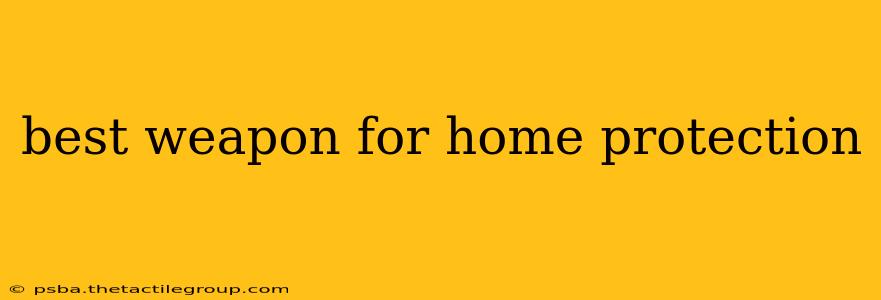Choosing the right weapon for home protection is a deeply personal and serious decision. It requires careful consideration of legal implications, your own skill level, and the specific threats you face. There's no single "best" weapon, as the ideal choice depends heavily on individual circumstances. This guide will explore various options, highlighting their pros and cons to help you make an informed decision. Remember, this information is for educational purposes only and should not be considered legal advice. Always check your local laws and regulations before acquiring or using any weapon for self-defense.
Understanding Your Needs and Legal Framework
Before even considering specific weapons, you need to understand:
- Your Skill Level: A complex weapon like a firearm requires extensive training and practice. If you lack experience, a simpler, less lethal option might be safer and more effective.
- Your Physical Capabilities: Consider your age, strength, and physical limitations when choosing a weapon.
- Local Laws: Gun laws vary drastically by location. Understanding your state's and local laws regarding firearms, less-lethal weapons, and self-defense is crucial. Illegal possession of a weapon can lead to severe penalties.
- Threat Assessment: What are you protecting yourself against? Burglars? Intruders with weapons? Knowing the potential threats helps determine the appropriate level of force.
Weapon Options for Home Protection
Several options exist for home protection, each with advantages and disadvantages:
1. Firearms
- Pros: Firearms offer the potential for stopping a threat at a distance, providing a significant advantage in a home invasion scenario.
- Cons: Firearms require extensive training, licensing (in many areas), and responsible storage to prevent accidents. Misuse can lead to severe legal consequences, even if used in self-defense. The potential for lethal force is a serious consideration.
2. Less-Lethal Weapons
These weapons aim to incapacitate without causing serious injury or death. Options include:
- Pepper Spray: Relatively easy to use and effective against multiple attackers. However, wind can affect its accuracy, and it may not be effective against individuals under the influence of drugs or alcohol.
- Stun Guns: Deliver a high-voltage shock that temporarily incapacitates the attacker. Effectiveness depends on proper contact and can be less effective against larger individuals. They may not deter someone determined to harm you.
- Baseball Bat/Other Blunt Objects: Readily available, but require close-quarters combat and carry a higher risk of injury to both the user and the attacker.
3. Security Systems
While not strictly weapons, security systems act as a critical deterrent and can summon help quickly:
- Alarm Systems: Alert authorities and neighbors to a potential break-in, deterring intruders and providing a faster response time for law enforcement.
- Security Cameras: Record events, deterring crime and providing valuable evidence if an incident occurs.
Choosing the Right Weapon for You
The "best" weapon is the one you are most comfortable, proficient, and legally permitted to use. Consider these factors:
- Training: Seek professional training for any weapon you choose, especially firearms.
- Practice: Regular practice is crucial for proficiency and safety.
- Storage: Store your weapon securely to prevent accidental injury or theft.
- Legal Counsel: Consult with a legal professional to ensure you understand your rights and responsibilities regarding self-defense.
Conclusion
Protecting your home and family is paramount. However, the choice of weapon is a significant decision that demands careful consideration of legal, ethical, and personal factors. Prioritize training, responsible use, and understanding the potential consequences of your actions. Remember that the best defense often involves a layered approach, combining security systems with personal protection measures. Your safety should always be your top priority.

